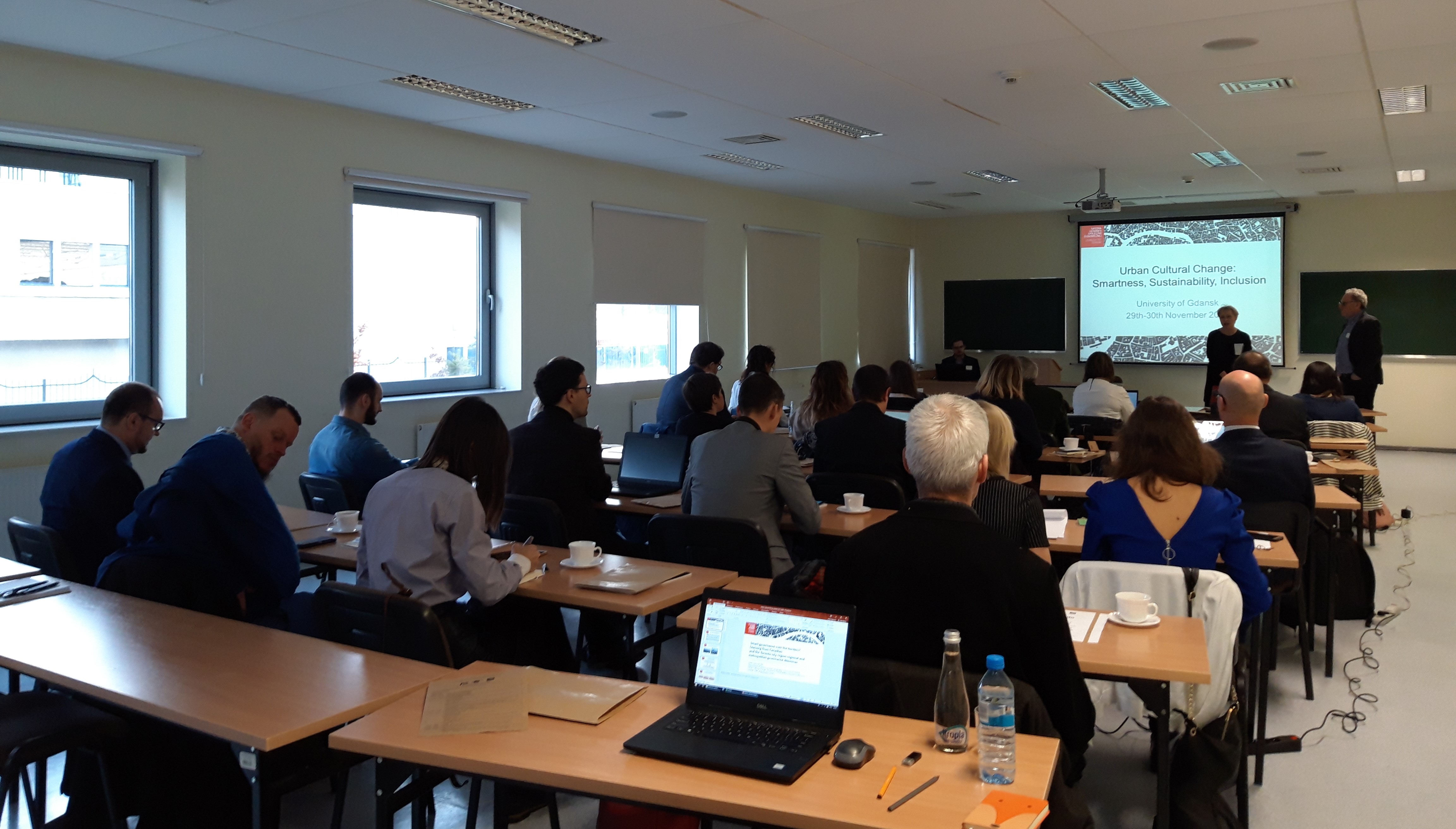The “Urban Cultural Change” Conference is behind us!

Urban Cultural Change: Smartness, Sustainability, Inclusion
Date: 29-30 November 2018 | University of Gdansk
The “Urban Cultural Change: Smartness, Sustainability, Inclusion” Conference was held in Gdańsk on 29-30 November 2018. More than thirty scientists from five European countries took part in it to discuss issues connected variously to the concept of “smart.” This notion was mentioned in the different context, including ICT tools, governance or growth issues.
The conference was full of thought-provoking interdisciplinary contributions. It offered perspectives, among others, from ongoing research, local experiences, theoretical and critical analysis, and policy debates, regarding the salience of smart cities as a holistic urbanist paradigm. The full Conference Programme is available here.
The multiplicity of opinions concerning the “smart city” was well-reflected especially in the emotional discussion in the final plenary session. It’s worth to mention just some of them to depict different dimensions of analysis of this concept.
The discussion began with the statement of Professor Grzegorz Gorzelak (University of Warsaw, EUROREG), who questioned the meaning of the notions like, e.g., creative cities, territorial cohesion or “smart cities.” He strongly argued that one should first decide, what exactly do they mean, to be able then to pursue further studies. “The more we use terms like “smart” or “smart management,” the less we understand the reality,” he said. Professor Marek Dutkowski (University of Szczecin), in turn, claimed that the scientific and public discourse concerning the notion of “smart” refers to the risks that occur at the interface between the institution’s activities and citizens’ expectations. He added that human geographers should attempt to identify both the most valuable elements of the concept, as well as its improper use.
Professor Dorota Sikora-Fernandez (University of Łódź) presented then a very concise definition of “smart city,” which is to use technology to improve the quality of life of inhabitants and at the same time to lower costs of public services. She agreed that “smart” is one of the common-used buzzwords and the products of IT companies, but at the same time can be a useful tool to develop citizens participation and democratic society. Professor Tassilo Herrschel (University of Westminster) shared the argument that “smart” is a very fuzzy concept and not a recipe for the contemporary challenges we are facing. Although at the same time it can, in his opinion, help institutions to confront peoples expectations, and to support connectivity between them. “The smart word forces public officials and IT companies to explain themselves,” he said and described it as a potential essential tool to facilitate democracy.
Professor James W. Scott (University of Gdańsk) referred then to the roots of the “smart” notion. They come from the concept of smart growth, which in turn goes from North American countries, which aimed to oppose the suburbs development and infrastructure-led growth. Therefore, as Professor Scott said, the idea appeared to oppose it and create a slow process of institutional change. He mentioned then he was terrified when the European Union initially reduced the meaning of “smart” to “digital fetishism” and empty notion, but at the same time admitted its use could lead to more democratic city planning and governance.
Summing up the statements mentioned above, Professor Iwona Sagan (University of Gdańsk) claimed that our whole social life is built on the concepts which mean different things, e.g., the concept of freedom. It is difficult to deconstruct it, she said, but at the same time, people are dying for it. Similarly, “smart” is an empty notion, but it has a meaning and has been coined for some reasons, not rarely to cover quite brutal activities of big companies. According to Professor Sagan, this is why we, as human geographers, should uncover the true meaning of “smart” concept and point the companies that it can also be not only what they want it to be.
We hope to host similar events in the future!


